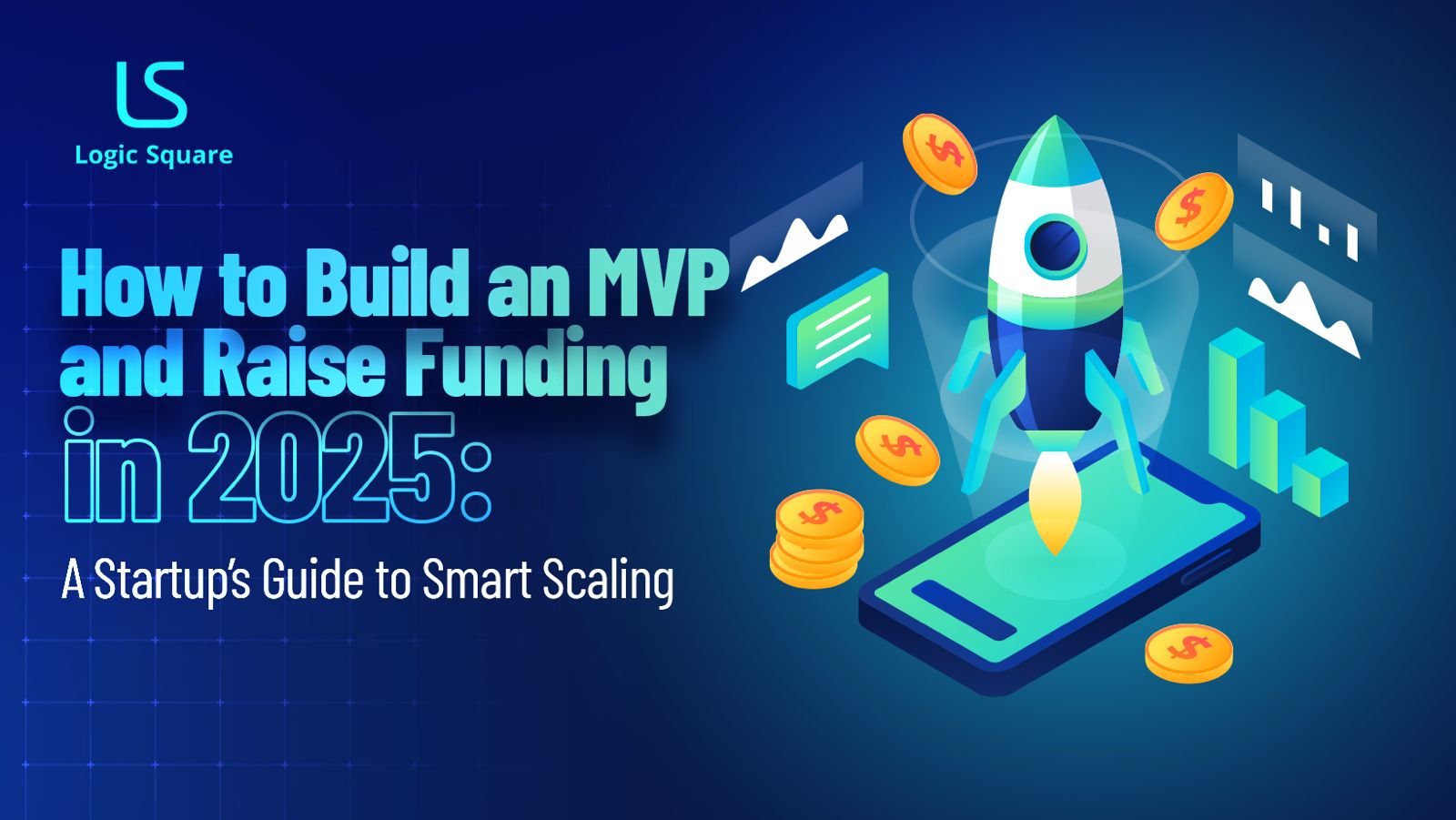Do you have financial insight and want to build your business around it? Have you ever thought about starting a FinTech company from scratch? If yes, then in this blog, we will discuss every aspect of creating a FinTech company while keeping it successful.
From the prospects of developing a FinTech startup and factors critical for FinTech startup to market insights and steps essential to start a FinTech company, we will cover everything. So, let’s go deeper with the concept of a FinTech app and understand how to create a FinTech startup.
Table of Contents
ToggleWhy Is It The Right Time To Start A FinTech Company?
The one thing that every FinTech startup owner should know is the financial prospects of a FinTech business model. As of 2023, over 1,00,000 FinTech apps in Google Play and Apple Store combined. The global market size for this app category has crossed $28,000 billion this year, and the valuation of more than 100 FinTech companies has reached $1 billion. FinTech companies secure better financial deals from venture capitalists compared to other business models. It is the most invested business category, with a 20.5% projected growth rate by 2027. In recent years, the number of FinTech apps has grown significantly.
Let’s understand the growth of FinTech apps with a table.
| Year | Google Play Store | Apple Store | Total | Growth Percentage |
|---|---|---|---|---|
| 2018 | 20000 | 15000 | 35000 | – |
| 2019 | 25000 | 20000 | 45000 | 28.6% |
| 2020 | 30000 | 25000 | 55000 | 22.2% |
| 2021 | 35000 | 30000 | 65000 | 18.2% |
| 2022 | 40000 | 35000 | 75000 | 15.4% |
| 2023 | 60000 | 40000 | 100000 | 33.33% |
Different FinTech Categories:
The FinTech services are The FinTech is a broad and ever-changing industry.
Many technological products and services fall under the FinTech business category. These technological innovations facilitate financial transactions and seamless financial management for individuals and organizations. To know how to build a FinTech startup, you should have complete knowledge about the FinTech categories and niches. It will help you decide the type of FinTech service you want to provide your customers.
#1 Blockchain & Cryptocurrency:
Blockchain-powered trading platforms and the intersection of cryptocurrency have transformed the FinTech landscape. Prominent cryptocurrency trading platforms such as Bitcoin, Bloq, and Wirex use blockchain technology to securely record financial transactions, transact, invest, and manage financial assets. Digital currencies, tokenization, smart contracts, and smart tekone offerings are some of the innovative solutions of this FinTech
category.
💡 Note: Do you know Coinbase is the market leader in the cryptocurrency Blockchain FinTech app category? Powered by Blockchain technology, Coinbase allows users to transact cryptocurrencies worldwide. The FinTech company has over 73 million users in more than 100 countries. In 2022, it has earn a little over $7.8 billion, a 100% revenue growth from 2021.
#2 Insurance (InsureTech):
It is another popular FinTech app category where companies use technology to facilitate the delivery of insurance products and services while improving the user experience. Insurance companies incorporate artificial intelligence, IoT, and advanced algorithms in their insureTech apps to serve their customers efficiently. High-value insure-tech solutions are transforming the way clients buy insurance products. InsureTech offers several benefits, including online remote accessibility, customized policy presentation, quick premium payments, etc.
#3 Regulatory-(Reg Tech):
The introduction of RegTech in 2015 has opened up a new opportunity for FinTech startups and other financial institutions to comply with regulatory frameworks and obligations easily. Regulatory technology has opened up a window for financial organizations to deliver seamless regulatory compliance with the support of cutting-edge technology. As financial regulations become increasingly complex, this technology can help organizations improve compliance and implement regulations digitally. RegTech automates various regulatory processes, including reporting, e-filing, transaction monitoring, and compliance updates.

#4 Lending (LendTech):
Lending Technology, or LendTech, is another emerging FinTech category that facilitates lending and borrowing, providing customers with easy financing options through technology. This FinTech category streamlines and simplifies loan processing by automating loan application submission, underwriting, peer-to-peer lending, and loan processing. The LendTech category uses AI and ML applications to validate customer identity and secure critical loan documents.

#5 Payments (PayTech):
The payment or PayTech category is the backbone of the FinTech industry with its revolutionary digital processing applications and networks. This category offers services, including credit card processing, debit card processing, peer-to-peer, and mobile wallet payments. Powered by robust internet connectivity and payment security, PayTech platforms can significantly improve user experience while securing consumer identity during transactions. PayTech platforms offer various digital transactions, including mobile payment systems enabling users to pay through technology.

#6 Stock-Trading (TradeTech):
TradeTech or Trading Technology is an emerging category of FinTech that focuses on automating the stock trading process for investors and implementing technology to streamline buying and selling. This type of FinTech platform uses cutting-edge IT systems and innovative applications to facilitate a fast and efficient trading process. These platforms include features like algorithmic trading systems, trading analytics, electronic trading platforms, market data analysis tools, and risk management solutions.TradeTech platforms improve the stock market’s proficiency, transparency, and response time.

#7 Consumer Banking-(BankTech):
Nowadays, many financial institutions and banks use BankTech to deliver services and banking solutions to their customers. Each financial institution uses a digitized FinTech platform to provide banking solutions automatically through apps. Economic technological companies help banks develop and customize their BankTech platform. The platform has transformed traditional banking methods and facilitated improved user experience, less operational friction, and lower banking costs.

everything.
The following table will help you understand the top FinTech categories and their market leaders at a glance.
| FinTech Category | Market Leader | Profit Earned in 2022 (USD) | Country of Origin | Operational Area | Current Valuation (USD) |
|---|---|---|---|---|---|
| Cryptocurrency | Coinbase | 7.8 billion | United States | Global | 68 billion |
| InsureTech | Lemonade | 390 million | United States | United States, Canada, Germany | 3.6 billion |
| RegTech | ComplyAdvantage | 100 million | United Kingdom | Global | 200 million |
| LendTech | LendingClub | 1.3 billion | United States | United States, Canada, Mexico | 3.3 billion |
| PayTech | PayPal | 25.7 billion | United States | Global | 194 billion |
| TradeTech | Virtu Financial | 4.2 billion | United States | Global | 23 billion |
| BankTech | FIS | 14.3 billion | United States | Global | 93 billion |
Why Developing A FinTech App Is Necessary For A FinTech Startup?
The table shows that the number of FinTech apps doubled every 5 years. The increasing demand for affordable financial services has contributed to the growth of this app category. The growing availability of smart devices and high-speed internet access also drive the success of FinTech apps. Experts believe that the FinTech industry is still in its early stages, and it is a great time to be involved in this industry and build a FinTech app. So, if you want to start a FinTech startup, the time is now!
Things To Consider Before Starting A FinTech Startup:
Before starting a FinTech company, there are a few things every FinTech startup owner should know. Among them, one of the most important things is to refrain from copying any successful FinTech business model to build a business. Just mindlessly copying a business model can end up in a disaster.
It may lead to winding up your company and losing all the money you have. There is no substitute for in-depth market research and planning beforehand. But that’s not all! Let’s discuss the things to consider when building a FinTech company.
- Keep Your Business Concept Simple:Do not build any high-level business model to make your business idea
innovative. Instead, try to figure out what problem your FinTech startup
is solving. Invest your time and resources to identify the pain points of
your target audience and how your FinTech solution can make their lives
easier. - Understand Your Target Market:Identify and analyze your target market to understand the FinTech
solutions they are currently using. What are their needs? What age group
do they belong to? What is the purchasing power of your target audience? - Solve Multiple Problems To Make Your Venture Sustainable:Do not just try to solve one issue with your FinTech solution. Address
multiple issues and find effective solutions to make your FinTech app
successful and sustainable. It will help you build a powerful USP for your
FinTech solution. - Evaluate Available Identical Solutions In The Market:There may be multiple solutions available in the market identical to your
solution. You must check them all out to identify their approach to
solving the problems. Solutions may be similar, but your approach should
be unique to address the issues. - Develop An Effective Fund Utilization Strategy:As a FinTech startup owner, your job is still ongoing after securing
funds from your investors. From the very start, keep a solid ROI plan in
mind and develop a complete fund utilization strategy to track the
expenses and identify the areas for improvement. - Firmly Believe In Your Idea:Last but not least, considering all the factors and contingencies, you
must believe in your FinTech solution and develop a robust strategy to
make your FinTech startup successful. - Join A FinTech Community:FinTech is rewarding; you will find people like you in the race. There
are many FinTech communities where you can connect with other FinTech
entrepreneurs and learn from their experiences. - Get Engaged In Open Source Projects & Workshops:You may also consider getting involved in open source projects, attending
webinars and industry events to learn about the latest FinTech technology
and build your FinTech startup. - Have A Robust Marketing Plan:One of the best practices for building a FinTech company is to develop a
sustainable marketing strategy to reach the target market and acquire
customers. Focus on creating a good marketing technique to penetrate the
crowded market.
How To Start A FinTech Startup-Steps For Developing A FinTech App:
Now that you have a primary idea about starting a FinTech startup, the next thing is to understand the steps for building a FinTech startup. Understanding these steps will also help you develop your FinTech app and launch it successfully.
- Come Up With A Unique FinTech Idea:To build a successful FinTech company, you must first develop a unique
FinTech concept with market viability. Each business starts with an idea
to attract new users, give them something new, and address their pain
points. In addition, the idea you come up with must convince the VC
investors to fund your FinTech startup. As a FinTech startup founder, your
business idea should be able to disrupt the market and attract new
customers. It’s critical to understand that the concept you come up with
may be familiar, but the approach you plan should be unique. For instance,
consider developing your idea on a particular FinTech subdomain you are
interested in, such as investment, trading, wealth management, payment,
blockchain-based FinTech ideas, or something else. - Validate Your Idea:It’s critical to validate your FinTech business idea. According to
statistics, almost 75% of all FinTech startups fail due to the
non-viability of their concept. Idea validation is the most cost-effective
way to prevent your FinTech startup from falling. To build the fittest
minimum viable product (MVP) of your FinTech concept, you must follow a 3
step idea validation process. You can start by defining a problem, then
define and identify the customers who may experience the pain, and finally
explain your innovation to solve the problem. Get approval for your
FinTech idea from your potential customers. Then, make a few successful
pitches to the investors. And lastly, complete 1 successful sale of your
app idea. You may consider using cutting-edge idea validation tools like
validation canvas and Javelin to analyze all the hypotheses. - Identify & Evaluate Your Target Audience:How to create a FinTech startup company? The best answer to this question
is to develop a FinTech solution that serves your target audience in the
best possible way. You must know who you are going to benefit from because
not everyone will find your FinTech services useful. For instance, if you
plan to launch a retirement savings service, your target audience should
be more mature and elderly. On the other hand, if your business idea is to
develop a digital wallet for smart buying and investment, you must target
a younger audience. Setting a target audience will also help you analyze
your Fintech startup’s ROI rate. - Idea categorization:This step is critical to build a FinTech startup. Why? Because this stage
will determine the FinTech category best suited for your idea. This stage
is also crucial for building a FinTech app to help you transform your
vision into a reality. For instance, if you have an idea to build an app
that will help farmers save their money on your app wallet and invest it
in agricultural commodities for higher ROI, then you need to develop an
investment app. Your business idea may also involve developing a FinTech
solution for unorganized laborers who can know different government labor
schemes and invest digitally; that’s a RegTech app. Idea categorization
will help your FinTech app development partner understand your app niche
and incorporate features and designs accordingly. - Define Your USP:Whether you are developing a neobank app, trading app, payment app,
cryptocurrency exchange platform, or something else, you must
differentiate your Fintech services. If your FinTech app domain is
crowded, you need a few differentiating factors or USPs to create a
competitive edge for your FinTech app. Consider introducing unique
features, cutting-edge tools, and capabilities exclusive to your FinTech
startup. Even if your concept is similar, develop a unique point of
attraction for your target audience, setting you apart from the rest. - Know The Laws & Market Regulations:FinTech is a highly regulated and governed sector, and to create a
FinTech startup, you must be familiar with every aspect of government
compliance. You should acquire as much information as possible regarding
legislation, governing bodies, legislations, restrictions, and criteria
for developing a FinTech startup. It is worth mentioning that General Data
Protection Regulation Authority (GDPR) rules apply to the common FinTech
subdomains. It regulates all companies that deal with client data. But it
is just the beginning. As a FinTech startup owner, you must comply with
anti-money laundering guidelines, KYC norms, and PCI DSS, a dedicated
FinTech regulation in the USA. Ensure that the app idea and the category
you propose must adhere to the existing laws of the land. - Research Your Competitors:You need to know the existing competitors in your Fintech niche to
deliver high-end FinTech solutions to your target audience. Once you
complete knowledge of FinTech industry regulations, it’s time to research
your competition. In-depth information about your rivals will help you
develop your Fintech app much more efficiently while incorporating
features of your own and using the existing features. Your hired FinTech
app development partner will certainly want to have a few current business
names of your FinTech category to understand the UI/UX and app features.
Furthermore, it will give you an idea of how your competitors position
their brands and design their FinTech apps. In-depth competitor analysis
will also help you identify their mistakes for not repeating while
developing yours. - Find A Good Investment Partner For Your Fintech Startup:Developing a high-quality FinTech solution is a costly affair for any
startup founder. But you need a good investor and venture capitalist to
start a FinTech company. From idea generation, validation, and app
development to launching and maintenance, you need a reliable Fintech app
development company that can take care of everything from the beginning.
So, to hire an experienced and efficient FinTech app development team, you
need resources. The high cost stems from maintaining that development
team, renting an office space, digital marketing expenses, and buying
software and technology licenses. cloud infrastructure, etc. To cover
these expenses, you need a knowledgeable financial advisor who can give
you money and guide you with genuine advice during difficult times. - Hire An Experienced App Development Partner:An inseparable part of building a FinTech startup is to hire an
experienced app development company. Your app development company must
have professionals competent in financial and technological domains. A
proficient FinTech app development team will help you choose the right
tech stack to deliver a functional product quickly. Consider outsourcing
your FinTech app development team, with a proven track record of
supporting reputed FinTech startups. They need to know the latest
technologies required for building a FinTech startup. From app ideation,
prototyping, and MVP development to product launch, support, &
maintenance, a good app development firm can handle everything. You must
also evaluate their abilities to develop a FinTech solution with a limited
budget and time. - Develop The Prototype, MVP, & Final Product:Your app development team will help you build your FinTech application by
completing several phases. These phases include discovery, design, MVP
development, product launch, and product improvements. Developing a
FinTech app needs many technologies, including artificial intelligence,
blockchain, microservices, and cybersecurity. With the help of these
technologies and good coding, your team will be able to build an effective
prototype for your FinTech app. Quick prototyping ensures quick MVP
development. Getting to the MVP development stage will reduce your cost
and time for launching your final product. In addition, it will also help
you gather user feedback quickly and improve your FinTech app. - Test Your FinTech App:A competent app development team will then carry out various QA and
testing such as user testing, functional testing, security testing,
performance testing, and usability testing. The quality assurance review
of your FinTech app to evaluate UX/UI, grammar, typos, and other errors.
App testing after development will allow you to find and fix problems and
bugs early and help you save money and time in the long run. - Launch Your Product & Improve Its Performance:Once your MVP is tested, the final step is to launch your FinTech app on
popular Play stores. Releasing your MVP will enable you to collect
valuable user feedback and improve its performance. To start a FinTech
company, launching your FinTech app is just the end of the beginning. From
this stage, you should begin testing new concepts and introduce new
features to improve user engagement. A comprehensive marketing and
promotional strategy will help you reach your target audience easily and
work on their opinions and feedback.
How Can You Prevent Your FinTech Startup From Failing?
A recent study shows that around 70% of FinTech startups fail within the first two years of their inception. The primary reasons are inadequate market research, regulatory challenges, and inadequate funds. In addition, the absence of idea validation also prevents FinTech startups from success. To tackle these challenges, FinTech entrepreneurs should incorporate various key strategies:
- You must conduct meticulous market research to identify the unmet needs
of your target audience. - Understanding regulatory compliance is paramount. It will help FinTech
startups navigate this sector more confidently. - Embracing agile development practices and staying adaptable allows for
quick responses to changing market dynamics. - A robust funding strategy will allow you to get past the hard times and
nurture a sustainable relationship with your investors.
How Logic Square Technologies Can Help You Start A FinTech Company?
FinTech is a challenging sector, and you need the help of an expert app development company with a proven track record of developing FinTech startups. Are you planning to start a FinTech startup of your own? Stop getting anxious! As a specialist in FinTech app development, we can help you create a FinTech company by providing you with the best solution. Contact us now to learn how to start a FinTech company.
We can help you with the initial planning and strategizing of your FinTech startup. Our expertise in frugal engineering sets us apart from others, allowing you to build your FinTech startup cost-effectively. We can help you develop your FinTech app from scratch and can also help you improve your existing FinTech app, which could be performing better. We keep you covered from prototyping and MVP development to testing and deployment. In addition, we provide expert consultation to help you connect with the right FinTech investors. Our developed MVP can help you secure funds promptly and grow your FinTech app company. Make us a technological partner of your FinTech startup and keep your venture successful.
Final Words:
Hopefully, this article helped you understand how to start a FinTech company in detail. The steps for building a FinTech startup mentioned in our article are optional for all FinTech startup owners. The step sequences may change based on your business goals, target audience, app idea, and fund. For instance, many FinTech firms start by raising funds as soon as they develop an innovative FinTech idea.
Creating a FinTech startup is challenging, and you need an experienced app development company to translate your idea into a reality. Compared to other industries, this sector has more regulations and complexities. To start a FinTech company, you need a strategic partner who is more than a developer. An efficient app development company can help you grow your FinTech venture by providing valuable industry insights and marketing support. If you need help determining how to start a FinTech company, reach out to us. With us, you will grow your FinTech company for sure.





